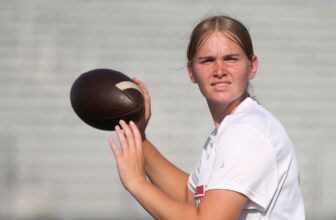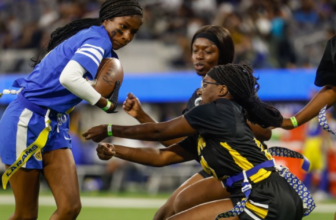In the vast expanse of the empty Legion Field bleachers Saturday, a member of the Mexican flag football team proudly posed for a picture with his national flag.
On the plastic turf below, the practicing Japanese national team was getting a taste of July-in-Alabama heat as the French teams were toweling off in the locker room.
For a few days, the Old Gray Lady once known as the Football Capital of The South will go international.
The World Games will bring the emerging sport of flag football to the 95-year-old bowl on Birmingham’s west side that once hosted some of the biggest college football games in the SEC.
Eight men’s and eight women’s teams will compete for the gold starting Sunday with competition running through Thursday. The US men’s team opens play at 5 p.m. CT against France while the women will face Panama at 3 p.m. CT. Both US teams are coming off titles at the 2021 World Championships over Mexico but the Mexican women took down their rivals to the north, 32-25 in a February exhibition before this year’s Super Bowl.
The sport is making a push to be added to the 2028 Summer Olympics in Los Angeles so its maiden voyage in the World Games is a step toward that goal.
Played on 50-yard fields with five players on the field at a time, it’s a fast-paced version of the sport. Not quite arena football, it’s closer to the rugby sevens that made it into the Olympics in 2016.
At practice Saturday, AL.com surveyed a few of the visiting athletes to get a feel for just how American college football resonates internationally.
Diana Flores, the quarterback from Mexico, has been playing the sport since she was 8 years old growing up in Mexico City. Her proximity to the US means more college games are available on television.
Does that mean she has a favorite team?
“Not really, to be honest,” she said. “I just like watching the games.”
What about the SEC? Nick Saban? Alabama?
“Oh, they’re very strong, right?” Japanese receiver/cornerback Kanako Nakazawa said.
They don’t get much American college football on TV in Japan, Europe or South America.
“Only NFL,” said French women’s team coach Vincent Vellenger. “And some of the March Madness.”
The same is true in Brazil, said national team member Amanda Boabaid who started with the sport in 2017.
“We stop everything now to watch the Super Bowl,” she said.
Boabaid is part of the extraordinary growth of women’s flag football, one that includes the state of Alabama. The AHSAA sponsored girls’ flag football for the first time last year, joining Florida and Georgia with Hewitt-Trussville winning the first state title in December.
“I love to talk about football,” Boabaid. “I love to live this football life with my teammates.”
The US women’s team is led by quarterback Vanita Krouch, a former basketball player at SMU. The roster has former volleyball and track athletes who didn’t have the opportunity to play the sport earlier.
The US men have several players with college experience while receiver Dezmin Lewis was a seventh-round draft pick to the Buffalo Bills in 2015 after playing at Central Arkansas. He never saw the field in the big leagues and is now a 6-foot-4 presence on the US roster, standing three inches above his next-tallest teammate.
The host team will have the challenge of competing without its starting quarterback in a twist that could help level the playing field. Darrell Doucette of New Orleans was taking the snaps in Saturday practice after serving as the backup QB in the 2021 World Championship team that competed in Israel.
Pierre Trochet, the president of the International Federation of American Football said the US players had a head start in learning the game given the sport’s overwhelming popularity.
“But the gap is getting smaller,” said Trochet, originally from France who played two decades on the offensive lines of tackle football in Europe.
The upset win for the Mexican women over the United States at the pre-Super Bowl exhibition helped make that case.
And the sport’s addition to the World Games lineup helps position the bid for the 2028 Olympic Games. That’s a process that’ll play out over the next 12 to 18 months, said Scott Hallenbeck, the CEO and executive director of USA Football.
Competing in the World Games helps plant the seed of Olympic dreams for the athletes.
“It’s like when Nick Saban goes in the locker room in the early stage of the season and says ‘You know what guys, this year we’re going to be champs,’” Trochet said. “Everybody gets an extra motivation to work out and learn the game, watch video and practice.”
See the full schedule of World Games flag football games on the official website.
Michael Casagrande is a reporter for the Alabama Media Group. Follow him on Twitter @ByCasagrande or on Facebook.
Travis Burnett
A pioneer in the flag football community, Travis helped co-found the Flag Football World Championship Tour, FlagSpin and USA Flag. Featuring 15+ years of content creation for the sport of flag football, creating and managing the largest flag football tournaments on the planet, coaching experience at the youth and adult level as well as an active player with National and World Championship level experience.









